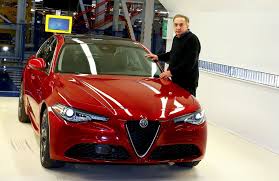Fiat Chrysler’s Marchionne dies, shares dive on profit slide

Former Fiat Chrysler chief executive Sergio Marchionne has died after a 14-year career in which he helped to rescue the carmaker, the news arriving on Wednesday moments before the group reported a surprisingly heavy fall in profit.
The announcement of the death of Marchionne, one of the auto industry’s most tenacious and respected CEOs, drew tributes from rivals and tears from his closest colleagues, a collective grief that overshadowed a big sell-off in Fiat Chrysler shares.
He had fallen gravely ill after what the company had described as shoulder surgery in a Zurich hospital. He was replaced as chief executive last weekend after Fiat Chrysler (FCA) said his condition had worsened.
FCA’s scheduled second-quarter earnings presentation, led by Marchionne’s successor and former lieutenant Mike Manley, began on Wednesday afternoon with a minute’s silence.
As eulogies flooded in, FCA shares fell up to 10 percent as investors digested an unexpected 35 percent fall in net profit, well below market forecasts.
“Unfortunately, what we feared has come to pass. Sergio Marchionne, man and friend, is gone,” FCA Chairman John Elkann, scion of the controlling Agnelli family, said in a statement.
Marchionne rescued Fiat and Chrysler from bankruptcy after taking the wheel of the Italian carmaker in 2004 and he multiplied Fiat’s value 11 times through 14 years of canny dealmaking. He was due to step down at FCA in April next year.
“The best way to honor his memory is to build on the legacy he left us, continuing to develop the human values of responsibility and openness of which he was the most ardent champion,” Elkann added.
NEW BOSS, SAME STRATEGY
On Saturday, FCA named Jeep division head Manley, 54, as head of the world’s seventh-largest carmaker, saying the Briton would execute a strategy that Marchionne had outlined in June.
FCA has said Manley will work to ensure a “strong and independent” future for the group.
On Saturday, Marchionne was also replaced as chairman and CEO of Ferrari and chairman of tractor maker CNH Industrial, both spun off from FCA.
Underlining the task facing Manley, FCA cut its full-year earnings outlook after the weaker-than-expected quarterly earnings. It blamed the result on a weaker performance in China, a market that represents one of new CEO’s immediate headaches.
“The biggest challenges we face and frankly we’re going to continue to face … are all focused in China,” Manley said.
FCA has yet to make any significant inroads in China.
In Marchionne’s June plan, FCA pledged to boost production of sport utility vehicles and invest in electric and hybrid cars to double operating profit by 2022. It unveiled bold targets for Jeep, FCA’s profit engine.
The future appears less clear at Ferrari, which Marchionne had been due to lead until 2021.
TRIBUTES PAID
Tributes arrived from industry figures and politicians worldwide, praising his perseverance, hard negotiating skills and candor.
Marchionne resurrected one of Italy’s biggest corporate names and revitalized Chrysler, succeeding where the U.S. company’s two previous owners – Mercedes parent Daimler and private equity group Carberus – both failed.
“Sergio Marchionne was one of the most respected leaders in the industry whose creativity and bold determination helped to restore Chrysler to financial health and grow Fiat Chrysler into a profitable global automaker,” said Ford Motor Co Executive Chairman Bill Ford Jr.
Daimler Chief Executive Dieter Zetsche in a post on Linkedin said, “The auto industry has lost a real giant. And many of us have lost a very dear friend: Sergio Marchionne.”
Marchionne flattened an inflexible hierarchy, replacing layers of middle management with a meritocratic leadership style. He slashed costs by reducing the number of vehicle architectures and creating joint ventures to pool development and plant costs.
A tough negotiator known for getting his way, in 2005 Marchionne forced GM to pay Fiat $ 2 billion not to exercise an option to sell its auto division to the U.S. carmaker – a move that may not have helped his later merger overtures.
Marchionne’s track record with operational turnarounds was a little more patchy than his dealmaking.
Profitability in Europe is only now gradually recovering, and Alfa Romeo has yet to turn a profit.
In North America, however, Marchionne was quick to end production of unprofitable sedans and retool plants to build pricier SUVs and trucks, a move since emulated by Ford and GM.
